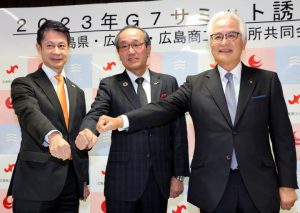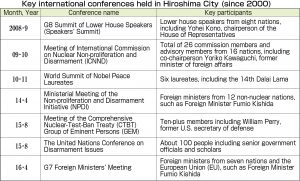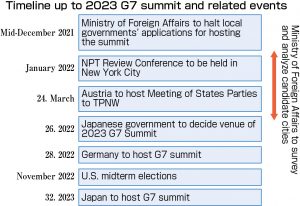Hiroshima bids to host G7 summit in hopes of being selected based on city’s previous experience
Dec. 1, 2021
City might have advantage as new Prime Minister Kishida’s home turf
by Koji Higuchi and Junya Kuchimoto, Staff Writers
On November 30, the Hiroshima Prefectural and Hiroshima City governments announced their participation in a bid to host the summit meeting of the G7 (G7 summit, attended by the Group of Seven industrialized nations), to be held in Japan in 2023. The city has expressed confidence it can meet the requirements for holding the summit based on its experience of having hosted other international conferences. Based on the assumption that Japan’s new Prime Minister Fumio Kishida being from Hiroshima is an advantage, the city sees the 2023 G7 Summit as an opportunity to send out a message of peace from A-bombed Hiroshima to the world. However, an entirely different scale of security measures will be needed for the summit, which gathers top leaders from across the world. Because the national government’s site-selection process is unclear, however, the path forward regarding the issue is uncertain.
A city senior official said with conviction, “We have argued the need for the elimination of nuclear weapons by inviting key figures to the city from around the world. It is only natural for us to make a bid to host the summit for leaders to gather.” What the city keeps in mind is its experience of hosting the G8 Speakers’ Summit in 2008, as well as the G7 Foreign Ministers’ Meeting in 2016, which took place that same year just prior to the Ise-Shima G7 Summit held in Mie Prefecture.
In the same year as the 2016 G7 Ise-Shima Summit, Hiroshima welcomed then U.S. President Barack Obama and, in 2019, Pope Francis. Hiroshima City Mayor Kazumi Matsui said, “We would be able to provide adequate security measures and facilities. I believe we can host the summit if the Japanese government could fully understand the benefits of holding the event here.” On the same day, November 30, Mr. Matsui held a press conference with Hiroshima Prefectural Governor Hidehiko Yuzaki and Koji Ikeda, chair of the Hiroshima Chamber of Commerce and Industry, and explained that the holding of a G7 summit in Hiroshima would have significance in sending a message of peace from the A-bombed city, which has the ability to meet the criteria for hosting the summit.
At the time of the G7 Foreign Ministers’ Meeting in April 2016, about 4,300 security staff including Hiroshima prefectural police and others were dispatched to provide security for the meeting. Meanwhile, when the G7 Ise-Shima Summit took place the same year in the following month of May, up to 23,000 security staff were mobilized to work the meeting. Another of the city’s senior officials shared their insight about the security issue. “Security requirements for holding the summit are remarkably stringent, with heads of state gathering together.”
The city lost its bid to host the 2016 G7 Summit, but the reasons for it not being selected as the venue were not communicated by Japan’s national government. Mie Prefecture was ultimately selected by the government, despite the fact that the prefecture had bid to host the summit after the government formally stopped accepting applications from other local governments. Speculation had it that Mie Prefecture was singled out by the prime minister’s office, which had requested the prefecture to participate in the bidding process. Many people continue to feel that the venue selection this time will be made as a political decision by the prime minister’s office.
Motoaki Yukihiro, ward commissioner of Hiroshima’s Naka Ward who worked to invite the 2016 G7 Summit to the city as director in charge of partnership promotion in the city government, said, “My understanding is that the officials at the Ministry of Foreign Affairs have assessed Hiroshima as a city that is qualified to host a summit meeting at any time, including from the perspective of facility availability. If anything is lacking, I believe it would be important for Hiroshima to have thorough discussions with the national government to close any gaps.”
The heads of nuclear nations such as the United States, France, and the United Kingdom will also join the summit. But one city senior official said, “With the sitting president of the United States, the nation that dropped the atomic bombs, already having visited Hiroshima once, it will be easier for leaders to come to the city. The foundation for welcoming them to Hiroshima has been laid.”
Another city official with experience in hosting the 2016 Foreign Ministers’ Meeting is paying attention to the presence of Prime Minister Kishida and shared expectations regarding the event venue. “As heads of three nuclear nations are included in the list of summit participants, it won’t be easy to hold the meeting in the A-bombed city. Therefore, if we cannot succeed in holding the meeting in Hiroshima this time when Mr. Kishida is serving as Japan’s prime minister, it will be difficult to do so at any point in the future.”
Judgments made by nuclear powers also key
On November 30, when the Hiroshima City and Prefectural governments announced their candidacy to host the 2023 G7 Summit, Japan’s national government also recognized the significance of holding the summit in the A-bombed city of Hiroshima, citing that Hiroshima serves as a symbol of world peace. Some challenging issues have been raised, such as the limited number of accommodations available. The most controversial issue, however, is whether the nuclear nations of the United States, the United Kingdom, and France can accept Hiroshima as the host city for the gathering. The intentions of Prime Minister Kishida (representing Hiroshima Prefectures District No. 1), who claims the abolition of nuclear weapons to be his life’s work, could influence the venue decision as well.
At the November 30 press conference, Hirokazu Matsuno, chief cabinet secretary, argued, “Hiroshima is a symbolic location that can make a strong appeal for world peace, given its historical background as the A-bombed city.” Mr. Matsuno’s comments were seen to reflect the passion of people in Hiroshima, the prime minister’s home.
In 2022, the year the decision will be made on the summit’s host city, a succession of anti-nuclear meetings are scheduled to take place in the city, which could serve as a big boost for Hiroshima in the selection process. In January next year, the Nuclear Non-Proliferation Treaty (NPT) Review Conference will be held, followed by the First Meeting of States Parties to the Treaty on the Prohibition of Nuclear Weapons (TPNW) in March. Presuming that certain outcomes will be achieved at the two meetings, a senior official of the Ministry of Foreign Affairs said, “If the G7 summit were to be held in Hiroshima, it would be a good opportunity to convey to the world a message about the preciousness of peace.”
Meanwhile, some in the government and the ruling parties hold the view that whether Hiroshima can host the summit will be influenced by the desire of the leaders of the United States, the United Kingdom, and France. Specifically, many in the United States still support the idea that the atomic bombing helped expedite the end of World War II. U.S. President Joe Biden is now struggling with sluggish approval ratings and may be reluctant to accept the summit in Hiroshima before he girds for battle in the midterm elections, a key milestone for him, in November 2022.
The Japanese government’s policy is to implement the selection process carefully because places other than Hiroshima—Fukuoka Prefecture and Fukuoka City, as well as Aichi Prefecture and Nagoya City—have also expressed their candidacies to host the summit. Foreign Minister Yoshimasa Hayashi (representing Yamaguchi Prefecture’s District No. 3) responded to questions at the November 30 press conference by reiterating his previous comments on the topic. “We will make a comprehensive analysis from various viewpoints such as accommodations, conference halls, transportation access, and security measures, and then make a decision,” said Mr. Hayashi.
(Originally published on December 1, 2021)










